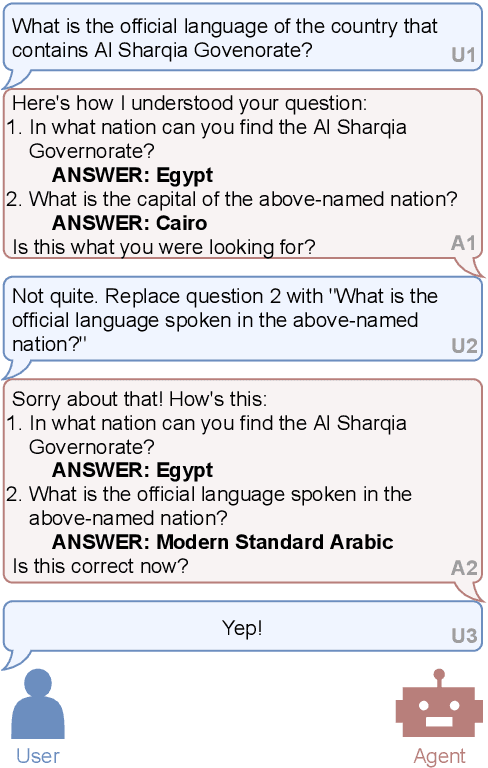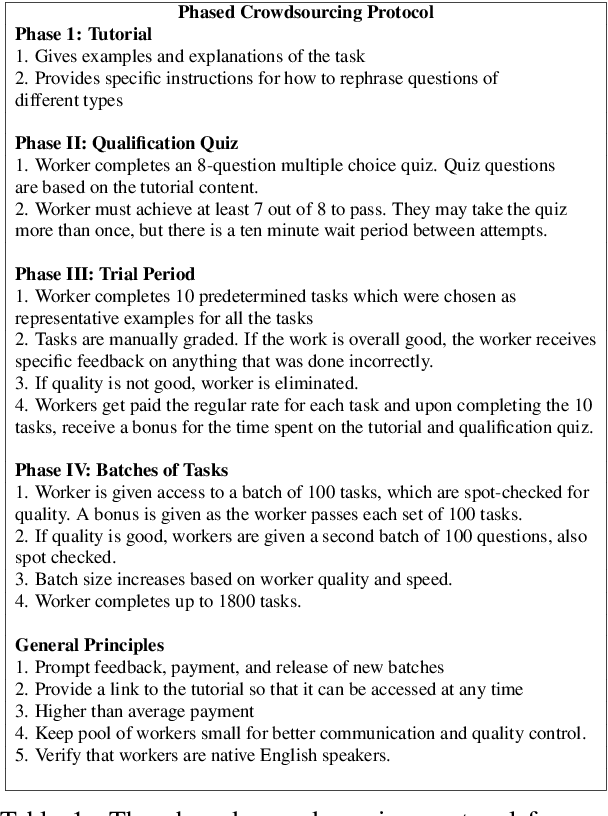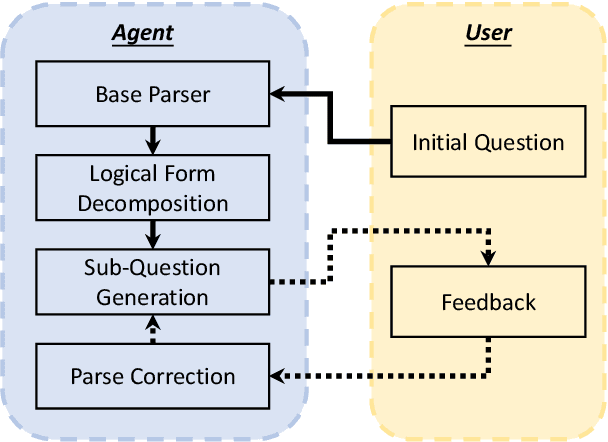Ashley Lewis
VISTA Score: Verification In Sequential Turn-based Assessment
Oct 30, 2025Abstract:Hallucination--defined here as generating statements unsupported or contradicted by available evidence or conversational context--remains a major obstacle to deploying conversational AI systems in settings that demand factual reliability. Existing metrics either evaluate isolated responses or treat unverifiable content as errors, limiting their use for multi-turn dialogue. We introduce VISTA (Verification In Sequential Turn-based Assessment), a framework for evaluating conversational factuality through claim-level verification and sequential consistency tracking. VISTA decomposes each assistant turn into atomic factual claims, verifies them against trusted sources and dialogue history, and categorizes unverifiable statements (subjective, contradicted, lacking evidence, or abstaining). Across eight large language models and four dialogue factuality benchmarks (AIS, BEGIN, FAITHDIAL, and FADE), VISTA substantially improves hallucination detection over FACTSCORE and LLM-as-Judge baselines. Human evaluation confirms that VISTA's decomposition improves annotator agreement and reveals inconsistencies in existing benchmarks. By modeling factuality as a dynamic property of conversation, VISTA offers a more transparent, human-aligned measure of truthfulness in dialogue systems.
Winning Big with Small Models: Knowledge Distillation vs. Self-Training for Reducing Hallucination in QA Agents
Feb 26, 2025Abstract:The deployment of Large Language Models (LLMs) in customer support is constrained by hallucination-generating false information-and the high cost of proprietary models. To address these challenges, we propose a retrieval-augmented question-answering (QA) pipeline and explore how to balance human input and automation. Using a dataset of questions about a Samsung Smart TV user manual, we demonstrate that synthetic data generated by LLMs outperforms crowdsourced data in reducing hallucination in finetuned models. We also compare self-training (fine-tuning models on their own outputs) and knowledge distillation (fine-tuning on stronger models' outputs, e.g., GPT-4o), and find that self-training achieves comparable hallucination reduction. We conjecture that this surprising finding can be attributed to increased exposure bias issues in the knowledge distillation case and support this conjecture with post hoc analysis. We also improve robustness to unanswerable questions and retrieval failures with contextualized "I don't know" responses. These findings show that scalable, cost-efficient QA systems can be built using synthetic data and self-training with open-source models, reducing reliance on proprietary tools or costly human annotations.
Smoothed Embeddings for Robust Language Models
Jan 27, 2025



Abstract:Improving the safety and reliability of large language models (LLMs) is a crucial aspect of realizing trustworthy AI systems. Although alignment methods aim to suppress harmful content generation, LLMs are often still vulnerable to jailbreaking attacks that employ adversarial inputs that subvert alignment and induce harmful outputs. We propose the Randomized Embedding Smoothing and Token Aggregation (RESTA) defense, which adds random noise to the embedding vectors and performs aggregation during the generation of each output token, with the aim of better preserving semantic information. Our experiments demonstrate that our approach achieves superior robustness versus utility tradeoffs compared to the baseline defenses.
Roll Up Your Sleeves: Working with a Collaborative and Engaging Task-Oriented Dialogue System
Jul 29, 2023Abstract:We introduce TacoBot, a user-centered task-oriented digital assistant designed to guide users through complex real-world tasks with multiple steps. Covering a wide range of cooking and how-to tasks, we aim to deliver a collaborative and engaging dialogue experience. Equipped with language understanding, dialogue management, and response generation components supported by a robust search engine, TacoBot ensures efficient task assistance. To enhance the dialogue experience, we explore a series of data augmentation strategies using LLMs to train advanced neural models continuously. TacoBot builds upon our successful participation in the inaugural Alexa Prize TaskBot Challenge, where our team secured third place among ten competing teams. We offer TacoBot as an open-source framework that serves as a practical example for deploying task-oriented dialogue systems.
Bootstrapping a User-Centered Task-Oriented Dialogue System
Jul 11, 2022



Abstract:We present TacoBot, a task-oriented dialogue system built for the inaugural Alexa Prize TaskBot Challenge, which assists users in completing multi-step cooking and home improvement tasks. TacoBot is designed with a user-centered principle and aspires to deliver a collaborative and accessible dialogue experience. Towards that end, it is equipped with accurate language understanding, flexible dialogue management, and engaging response generation. Furthermore, TacoBot is backed by a strong search engine and an automated end-to-end test suite. In bootstrapping the development of TacoBot, we explore a series of data augmentation strategies to train advanced neural language processing models and continuously improve the dialogue experience with collected real conversations. At the end of the semifinals, TacoBot achieved an average rating of 3.55/5.0.
Towards Transparent Interactive Semantic Parsing via Step-by-Step Correction
Oct 15, 2021



Abstract:Existing studies on semantic parsing focus primarily on mapping a natural-language utterance to a corresponding logical form in one turn. However, because natural language can contain a great deal of ambiguity and variability, this is a difficult challenge. In this work, we investigate an interactive semantic parsing framework that explains the predicted logical form step by step in natural language and enables the user to make corrections through natural-language feedback for individual steps. We focus on question answering over knowledge bases (KBQA) as an instantiation of our framework, aiming to increase the transparency of the parsing process and help the user appropriately trust the final answer. To do so, we construct INSPIRED, a crowdsourced dialogue dataset derived from the ComplexWebQuestions dataset. Our experiments show that the interactive framework with human feedback has the potential to greatly improve overall parse accuracy. Furthermore, we develop a pipeline for dialogue simulation to evaluate our framework w.r.t. a variety of state-of-the-art KBQA models without involving further crowdsourcing effort. The results demonstrate that our interactive semantic parsing framework promises to be effective across such models.
 Add to Chrome
Add to Chrome Add to Firefox
Add to Firefox Add to Edge
Add to Edge